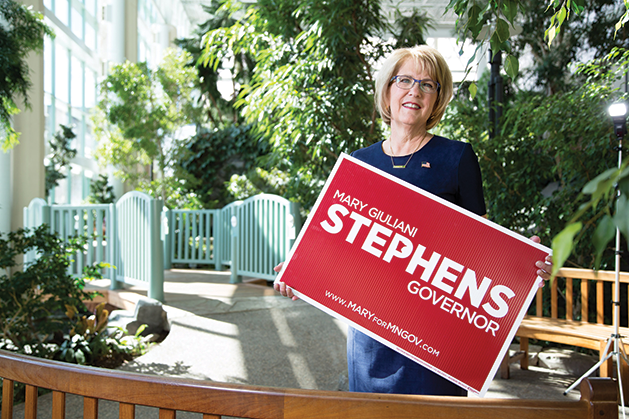
Woodbury’s mayor since 2011, Mary Giuliani Stephens, has announced that she is running for governor of Minnesota on the Republican ticket. The lawyer and former City Council member is currently serving her second term as Woodbury mayor, which ends at the end of 2018. Balancing her mayoral responsibilities, a busy campaign and family, she shares her heart to serve.
“I’ve learned a lot in my role as mayor and I am proud of Woodbury and how efficient and effective we are,” she says, noting that Woodbury is the only city in Minnesota to achieve the highest award of excellence for performance measures from the International City County Management Association.
Stephens’ top priority as mayor is economic strategic development. This led to the important redevelopment of the former State Farm Insurance campus in Woodbury into the 100-acre, mixed-use development CityPlace, which she says is a model for horizontal redevelopment. She is also proud of the safe community and quality schools Woodbury offers its residents.
“We really work hard to be accountable to our residents,” Stephens says. “If you look at the city as an organization, we exist because we are elected and put into office by the citizens of Woodbury. It’s their money we hold and are spending, and we want to be responsible and responsive to them. It’s a service business—we are here to serve the people.”
She now wants to take what she calls a “servant leadership” approach to serve the state of Minnesota. “I think people are frustrated in Minnesota. With all of the bickering and everything that is going on, I think that they want somebody to come in and get the work done. I think people are tired—I am tired of that,” says Stephens, whose craving for action prompted her to seek political office at the state level.
“As a leader, you have to come in and be strong; you have to be bold. You have your vision and set your priorities,” she says. “But within that, people have differing opinions. If you’re going to accomplish anything, you have to be willing to sit down and listen to people. “I know that everyone who runs says, ‘I am the nonpartisan,’ ‘I’m the bridge builder.’ But I’ve really had to make it happen and do that here. You can’t just bicker and not get things done at the local level, and I think people are looking for that at the state level.”
Balancing her roles as mayor and gubernatorial candidate means pulling back on some discretionary activities, like vacations and time with friends. “You set your priorities and determine what you have to give up for that season,” Stephens says, but family time is still a priority. “I protect my Sundays. We worship together and we have a meal together.”
Stephens ultimately credits her faith for her political journey. “I have a strong faith, and I believe that God created everybody and gives everybody certain gifts,” she says. “I think God gave me a heart for people, and a heart for serving.”
The Election Process for Governor
Precinct Caucuses
Voters attended these on February 6 to show support for their preferred candidates by participating in the candidate endorsement process that leads up to the state party conventions. Political parties hold local meetings and may endorse candidates, select delegates, and set goals and values.
Organizing Unit Conventions & Congressional District Conventions
Delegates elected at precinct caucus endorse candidates for the state legislature and choose delegates to move on to the state conventions (GOP June 1-2 in Duluth, DFL June 1-3 in Rochester). Party delegates vote to endorse candidates for governor, lieutenant governor, attorney general, secretary of state and state auditor, and U.S. Senate.
Elections
The primary election on August 14 will determine which candidate will be on the ballot representing each party in the November 6 general election.









